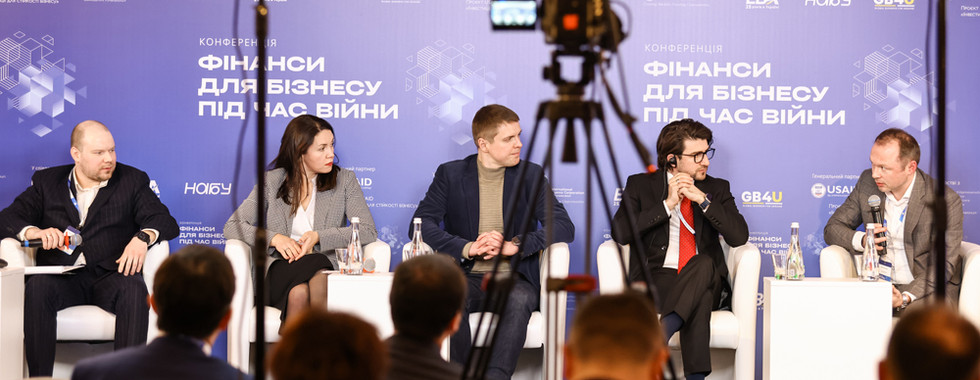Access to Finance in Wartime: What Businesses Should Know
- Feb 13, 2024
- 11 min read
Updated: Feb 19, 2024
On February 8, the European Business Association, together with the Independent Association of Banks of Ukraine, held a special event called “Finance for Business in Wartime” with the support of international donors – the USAID Investment for Business Resilience Activity (formerly USAID Financial Sector Reform Activity) and IFC’s Asset Based Finance Project, implemented in partnership with the Swiss State Secretariat for Economic Affairs (SECO), which focused on business access to financial support instruments.

The first panel focused on the regulatory environment and tools for mitigating regional risks. Dmytro Natalukha, Head of the Verkhovna Rada Committee on Economic Development, emphasized the overregulation of many processes and procedures currently being worked on. In particular, the principle recommended for adoption is currently being considered – we propose 1 regulation and cancel 2. Currently, there are more than 1,200 regulatory acts in the country, for example, more than 100 in the field of environment. Thanks to USAID, they were analyzed and found to be ineffective, with 37 of them inefficient and 38 duplicating each other. Mr. Natalukha also shared progress in the military sector: yesterday, the President signed a law that simplifies the write-off of destroyed equipment. In general, the system is overloaded with bureaucratic requirements. One of them is for business, for example, restrictions on the employment of foreigners. The next aspect of the agenda is digitalization (in particular, draft law No. 5837, which provides for areas, for example, where inspectors can be replaced by an automatic process. Another area is the unification of the permit system through obtaining permits in 1 system. According to Mr. Natalukha, all this will help save budget funds, create conditions for business, have an adequate control framework (where the focus will be on violations, not attempts to exert pressure), etc.

Danylo Hetmantsev, Head of the Verkhovna Rada Committee on Finance, Tax and Customs Policy, emphasized the tools to support business. Yes, state support is being reduced, but even so, more than UAH 40 billion has been allocated in the budget to help businesses (support for programs with significant investments – UAH 3 billion, creation of industrial parks – UAH 1 billion, humanitarian demining – UAH 3 billion). In addition, we have launched programs to ensure military and political risks, and we have many agreements with international partners (MIGA, EBRD, etc.). However, these programs need to be scaled up to be systematic, not just isolated cases. The program “Affordable Loans 5-7-9%” has already provided over UAH 180 billion in loans. However, it is crucial to expand commercial lending, so we need to work with banks separately, as the Affordable Loans 5-7-9% program is no longer enough. He also thanked transparent businesses for supporting de-shadowing and entrepreneurs who are coming out of the shadows, realizing the importance of transparent work.

Kateryna Rozhkova, the First Deputy Governor of the National Bank of Ukraine, focused on macro financial aspects and lending. Thus, the country has maintained macro-financial stability, with a GDP growth of 6%. This has created the preconditions for intensifying lending. Due to the reduction in the discount rate, business rates were also reduced (by 1.5% over the past year). In addition, the credit metrics of many companies have improved, with the volume of certificates of deposit now standing at around UAH 800 billion (a record amount of liquidity). This means lower interest rates, increased solvency of businesses, growing domestic demand, and export opportunities. At the same time, according to Ms. Rozhkova, we have passed the peak of credit losses due to the war that occurred in 2022. Together with banks, the NBU has now developed mechanisms to support affected businesses (various restructuring mechanisms, etc.). Of course, the 5-7-9 program was and is important, especially in the first year of the war. However, there has been an adaptation, interest rates have been reduced, and the condition of enterprises has improved, so this program should be refocused. The NBU is analyzing it and will prepare proposals to redirect the program to where support is needed most (for example, in the de-occupied territories to restore business from scratch, etc.)

Volodymyr Kuzyo, Deputy Minister of Economy of Ukraine, shared various practical support tools available. In particular, war risk insurance. Yes, this tool is provided by many organizations. In particular, MIGA (created a trust fund, financed 4 projects, this is not property insurance), DFC (also not property insurance, implemented 5 projects, some of them are risk sharing), EBRD (this is also property insurance in Ukraine; it is also expected that this year the mechanism for insurance of goods in transit in Ukraine will be launched). At the same time, there is the Export Credit Agency of Ukraine, international export credit agencies (here, Ukraine’s task today is to reclassify the country’s risk into category 6, and in the case of joint ventures, so that other countries can provide insurance support for Ukrainian businesses). Also, the mechanism of reinsurance of the risk of entering the Black Sea has been launched (the fund is $ 50 million, where $ 20 million is public funds; within the framework of this tool, not only agro but also other export goods are insured; last week it was released for insurance – this is 0.75% of the cost of the vessel and Loids of London is considering 15 more applications).

Agil Abdullayev, an IFC consultant, shared information about the organization’s projects and business financing instruments. Detailed information about these instruments can be found in the presentation.

Vira Savchenko, Executive Director of BDO Ukraine, and Olga Balytska, Head of Real Estate and Infrastructure at PwC Ukraine, as well as members of the Board of the Ukraine Recovery Committee, emphasized the importance of financial support instruments for business in the framework of Ukraine’s reconstruction, the importance of having effective instruments, which are not yet available to Ukrainian business. So, hopefully, the situation will gradually change.

Ruslan Spivak, Corporate Business Director at Raiffeisen Bank, emphasized the need for support for businesses, including those particularly affected. In his opinion, a separate focus should also be made on the green economy and support for exports and domestic producers, as import substitution is important in difficult conditions and from the point of view of logistics. There is an appetite for financing in the market, as there was a decline in the portfolio until July 2023. Since July, demand has increased, and banks are ready to continue working on it.
The participants of the second panel discussed topical issues of business lending during the war.

Stanislav Toshkov, representative of the Delegation of the European Union to Ukraine, emphasized the significant support provided to private sector development in Ukraine in recent years. The European Union intends to increase the scale of this support and continue to work with the government and the financial sector to effectively target programs. The partnership with the European Investment Bank (EIB) and the International Finance Corporation (IFC) also facilitates the dissemination of financial instruments and risk-reduction programs to support small businesses in Ukraine. Mr. Toshkov mentioned specific initiatives such as the EU4Business Guarantee Facility, the IFC’s Small Loan Guarantee Program, and the EBRD’s SME Competitiveness Program, which focuses on green investments. Looking to the future, Mr. Toshkov expressed his readiness to work together to maximize the impact of EU support in the country and emphasized the EU’s commitment to listen to the needs of the financial sector and align support with national priorities.

Volodymyr Kuzyo, Deputy Minister of Economy of Ukraine, spoke about the current state of the lending market in Ukraine, focusing on both the corporate and individual sectors. The speaker noted that the volume of lending to legal entities has decreased, but lending to individuals has increased. In particular, through the program “Affordable Loans 5-7-9%”, which the government developed to promote the growth of small business lending. The program continues to evolve and be modified, in particular, focusing on investment needs rather than working capital financing. Other incentives provided in the budget include support for industrial parks and grants for entrepreneurs in various sectors. Mr. Kuzyo also outlined programs aimed at developing housing construction, purchasing agricultural machinery, and humanitarian demining. In addition, the government, in cooperation with international financial organizations, is involved in the development of programs, financing instruments, and the allocation of funds for projects in Ukraine to meet market needs and facilitate lending.

Andrii Hapon, Executive Director of the Business Development Fund, also shared insights into the evolution of the Affordable Loans 5-7-9% program. Thus, the program covers new sectors, such as waste recycling and energy services. He drew attention to the changing credit needs of businesses under the program and emphasized the Ministry of Economy’s vision of strengthening the investment component of the program and the environmental and social standards required by foreign investors. Banks now need to adapt their lending policies to meet these standards. A new program called “Affordable Factoring” was also introduced to provide companies with additional financial resources. Mr. Hapon noted that clear communication and coordination between government agencies, banks, and stakeholders will ensure the smooth operation of lending and support programs for Ukrainian businesses.

Yuriy Katsion, Deputy Chairman of the Board of JSC Oschadbank, also confirmed the importance of financing alternative energy projects in the context of global change. The importance of ESG standards in evaluating investment projects for both large and medium-sized businesses is also growing. In 2015-2020, there was a boom in Oschadbank’s financing of alternative energy projects, which was caused by government support and feed-in tariffs. However, Mr. Katsion noted that due to the war and changing market dynamics, the motivation for these projects has shifted towards energy security and self-consumption. The Deputy Chairman of the Board emphasized the importance of market instruments for balancing supply and demand and acknowledged that programs that promote stability in the face of uncertainty are necessary.

Olena Gil, Banking and Portfolio Guarantees Specialist at the USAID Investment for Business Resilience Activity, presented the Project’s grant programs with financial intermediaries, programs to develop the factoring and leasing markets, and a recently launched co-investment initiative for medium and large enterprises aimed at increasing sales, exports, and jobs. Through the co-investment program, the Project aims to help businesses increase the number of jobs by up to 20,000 in 3 years and increase sales (including exports) of these enterprises by at least $250 million. At the same time, we expect our existing grant programs will provide more than 440 micro, small, and medium-sized enterprises with affordable financing, including working capital lines, leasing, and factoring financing. Olena also emphasized the importance of raising business awareness of financing opportunities and available financial products. International support programs have been summarized by our Project, and the list includes at least 14 international institutions that implement 39 support programs for SMEs. Thanks to our cooperation with AgriAnalytics, this information is now available to everyone in the form of a convenient search tool https://agrianalytica.com/uk/matrix/banks-and-finance

Ruslan Hashev, Chairman of the Board of Export Credit Agency, discussed the key factors that influence decision-making in military risk insurance. In fact, the existence of a foreign economic agreement, the financial condition of the insured, and the risk assessment of the country concerned. As Ukraine is classified as a high-risk country, additional measures have been introduced to assess the financial stability of Ukrainian entities and foreign buyers. Regarding the capital structure, Mr. Hashev suggested potential solutions, such as replacing VAT with other instruments or monetizing VAT through the National Bank. He also suggested expanding the capital through partnerships with investors and guarantee obligations, emphasizing the importance of bringing the legislation in line with international practice.

Betule Kurtulus, FCI Regional Director for Central, Eastern, and South-Eastern Europe, spoke about FCI’s role in supporting the development of the factoring industry around the world, including Ukraine. FCI focuses on factoring, invoice discounting, and other supply chain finance solutions, working closely with policymakers, stakeholders, and investment banks to promote factoring. Ms. Kurtulus spoke about FCI’s main activities, including legal infrastructure, education, promotion, compliance, and networking, which contribute to the development of factoring worldwide. She emphasized the importance of a legal framework, secure ownership of receivables, and reliable financial institutions to facilitate factoring operations. In terms of government regulation, qualification requirements for factors, registration, licensing, and public registers are important to ensure a favorable environment for factoring operations. In conclusion, she reiterated FCI’s readiness to support the Ukrainian financial ecosystem and offer assistance when needed.
During the third panel, the participants discussed the current state, opportunities, and prospects of the factoring market in Ukraine.

Serhiy Savchuk, Director of the Department of Methodology for Nonbank Financial Institutions of the National Bank of Ukraine, emphasized the importance and necessity of the Law of Ukraine on Factoring and informed about the process of its development. Currently, the government agencies have completed the first stage of the reform of state regulation of the financial market and will continue to work on sectoral laws. In particular, the NBU, together with its partners, international experts, and donors, is currently working on the Law on Factoring. The NBU has set itself an ambitious goal of finalizing and submitting the relevant draft law to the Verkhovna Rada by the end of the first half of this year.

Pavlo Matiiash, General Director of FC Activis, confirmed that non-banking institutions also work with factoring. Thus, at present, it takes 4 hours to decide between Activis Financial Corporation, up to 48 hours to receive money, and the transaction and financing are carried out online. Most decisions are unsecured up to UAH 5 million, and the main clients are SMEs. In the last quarter of last year, the company received 185 applications 60% of them were approved, and half of them used factoring, i.e. about 60 clients, with an average check of UAH 800 thousand.
In the future, the company plans to develop new digital solutions for factoring operations: decision-making within 15-30 minutes and receipt of funds on the same day. According to Mr. Matiiash, there is a desire and need to introduce factoring in public procurement. This is an important area that will allow SMEs with limited capital to participate in the execution of contracts in public procurement.

Lina Zaika, Head of the Factoring Unit at OTP Bank, said that the bank is in demand for factoring, in particular, due to the need to replenish working capital. Factoring is also used for import operations to reduce currency risks. Due to the rates currently offered by the market, demand is growing, so there are hopes to increase the volume of this product to European levels.
OTP has several factoring solutions, in particular for SMEs. One of the solutions, developed jointly with USAID for businesses with sales of up to EUR 50 million, has a factoring rate of 7% per annum Limits – UAH 20 million for 3 years, unsecured, advance payments of up to 90% and deferral of up to 270 calendar days. OTP also joined the Affordable Factoring 5-7-9 program with the support of the Business Development Fund. As part of this program, the cost of factoring for a Ukrainian manufacturer is 13% per annum, the limit is UAH 150 million and three years, and the term is 360 days.

Serhii Anufriienko, FUIB’s Corporate and Trade Financing Director, also confirmed the demand for this instrument from SMEs. The bank’s offer today depends on the willingness of debtors to do factoring with such clients. There is a problem with the prohibition of assignment and deferral, but also with the desire of large companies to work with this product. In addition, the factoring market lacks a large debtor – the state. No state-owned corporation has such a product in its portfolio. If the state gets involved, it will be a very powerful impetus.

Teymur Heybatov, Head of the IFC Asset-Based Financing Project at the International Finance Corporation (IFC), said that the main goal of the project is to improve access to finance for SMEs. The project focuses on improving the regulatory environment and legislation, the need to develop financial infrastructure and promotion in the public and private sectors. The IFC project aims to create two infrastructure solutions: an asset-based financing platform and an electronic invoice recording system, within which factoring and other supply chain financial products will be further developed.

Serhii But, Chairman of the Board of Prozorro.Sale, said that several markets have been launched or transformed based on Prozorro.Sale, including real estate, finance, resources, railcar rental, and the land market. Prozorro.Sale is also working with partners to launch a factoring platform based on public procurement – the market is estimated at UAH 400 billion a year. This will help develop the factoring market and can increase the competitiveness of procurement by up to 2.5 times. It also creates new opportunities for small and medium-sized businesses, as the availability of factoring tools can increase the supplier base in public procurement by 20 thousand companies. The next step is to expand the practice to the commercial market.




















Comments